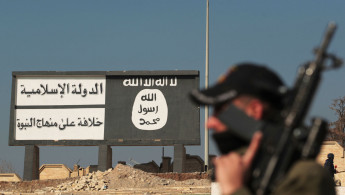UN: Islamic State militarily on the defensive
The Islamic State group is militarily on the defensive, facing a drop in revenue from oil and extortion and a shrinking ability to attract new recruits, according to a new UN report released Monday.
UN Secretary-General Antonio Guterres warned however in the report to the Security Council that IS jihadists continue to pose a grave threat and are "partially adapting" to losses on the battlefield.
"ISIL is militarily on the defensive in several regions, notably in Afghanistan, Iraq, Libya and the Syrian Arab Republic," said the report sent to the council on Thursday.
IS finances are on a decline, forcing the militant group to operate on a "crisis budget," it added.
Illicit oil sales, mainly from oil fields in Syria's Deir az-Zour province, dropped from as much as $500 million in 2015 to $260 million last year.
The report urged governments to be vigilant of IS efforts to find new revenue streams, citing concerns that journalists and aid workers traveling to areas recaptured from the jihadists could be targets for kidnapping.
The flow of foreign fighters to Iraq and Syria has slowed considerably, because of security measures taken by governments and also due to the "diminished attractiveness" of the group, said the report.
Several member-states are reporting that many hardened foreign fighters will remain in Iraq and Syria as most of those who intended to leave have already done so.
"The ability of ISIL to attract new recruits has diminished, and fighters are increasingly leaving the battlefield," it said.
The council will meet Tuesday to discuss the report as President Donald Trump has ordered US generals to draw up a new plan to defeat the radical extremists.
Iraqi forces are making strides in their offensive to drive the Islamic State from Mosul, the country's second city seized in 2014 and proclaimed as the capital of a caliphate stretching into Syria.
In response to the military pressure, IS communication and recruitment "are increasingly moving towards more covert methods, such as the use of the dark web, encryption and messengers," said the report.
"The group continues to encourage its followers and sympathizers outside conflict zones to perpetrate attacks."
Agencies contributed to this report.





 Follow the Middle East's top stories in English at The New Arab on Google News
Follow the Middle East's top stories in English at The New Arab on Google News
![The UAE is widely suspected of arming the RSF militia [Getty]](/sites/default/files/styles/image_330x185/public/2024-11/GettyImages-472529908.jpg?h=69f2b9d0&itok=Yauw3YTG)
![Netanyahu furiously denounced the ICC [Getty]](/sites/default/files/styles/image_330x185/public/2024-11/GettyImages-2169352575.jpg?h=199d8c1f&itok=-vRiruf5)
![Both Hamas and the Palestinian Authority welcomed the ICC arrest warrants [Getty]](/sites/default/files/styles/image_330x185/public/2024-11/GettyImages-2178351173.jpg?h=199d8c1f&itok=TV858iVg)